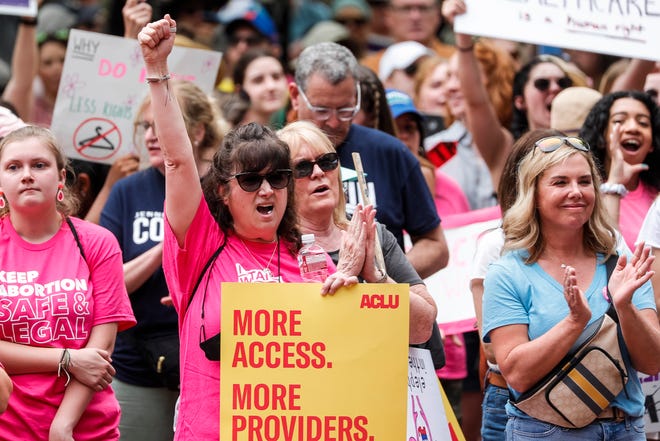Months after the Supreme Court removed constitutional protections for abortion, voters in several states moved to preserve access to the procedure.
Voters in California, Michigan and Vermont enshrined reproductive rights in their state constitutions, while Kentucky voters said no to a proposal that would have rejected abortion protections in the state constitution. Meanwhile, a Montana abortion-related referendum had not yet been called as of Wednesday morning.
Since the end of Roe v. Wade, several states expanded abortion rights, while some sought to ban the practice outright or shorten the viability time. As of the beginning of November, more than 10 states banned abortion virtually in all cases, according to the Guttmacher Institute, a research and policy organization that supports abortion rights.
Here is a look at recent events:
- Kansas spurned an initiative to remove abortion rights from its state constitution in August.
- Louisiana and Arkansas are among several states that barred the procedure even in the case of rape or incest.
- Georgia’s recent abortion law bans the practice sometimes as early as six weeks, often before many people know they are pregnant. That ban is being challenged in court.
Elizabeth Nash, the Guttmacher Institute’s principal policy associate for state issues, said the amendments in California, Michigan and Vermont are crucial because they are a firewall should anti-abortion lawmakers gain control of the state legislatures.
“We also hope other state legislators can learn and be inspired by this turnout for abortion rights,” Nash said.
OTHER KEY BALLOT MEASURES:Weed, voting, minimum wage and more
The five states – California, Michigan, Vermont, Montana and Kentucky – put reproductive issues before voters in November. Here’s more on how those initiatives are panning out:
Voters go for Michigan’s Proposal 22-3
Michigan’s Proposal 22-3 establishes in the state constitution a right to reproductive freedom, including contraception, abortion and sterilization.
The state had a dormant 1931 ban that made aborting a fetus a felony unless it preserves the carrier’s life. The law has not been enforced since the Roe v. Wade decision in 1973, and abortions in the state have continued after courts have blocked the ban.
Michigan’s vote on abortion comes in the same race that Gov. Gretchen Whitmer won against Republican challenger Tudor Dixon, who opposes the procedure in most cases. Whitmer, a Democrat, made abortion access a crucial part of her campaign.
Californians say yes to Proposition 1
Placed on the ballot in response to the Roe decision, California’s ballot measure to codify abortion protections in the state’s constitution was a winner with voters.
The measure, called Proposition 1, protects the right to choose to have an abortion, as well as the right to “choose or refuse contraceptives.”
Vermont enshrines abortion protections
Before the end of Roe v. Wade, the state already had a 2019 law that assures abortion rights, according to The Associated Press. On Tuesday, voters decided to enshrine reproductive autonomy.
Montana voters weigh ‘born alive’ measure
Montana votes are still being tabulated as of mid-Wednesday afternoon on a ballot measure making infants “born alive” legal people, including in cases of an attempted abortion. The protection already exists under a 2002 federal law giving infants the safeguard older people get.
The referendum defines a “born alive infant” as one who breathes, has a beating heart, or has a “definite movement of voluntary muscles” after expulsion or extraction from the mother. Health care providers found guilty of not providing to those born under the act could face imprisonment and a fine of up $50,000, according to the referendum.
Supporters have told USA TODAY the measure protects the life of the young. But opponents say it could cause medical professionals to disrupt the final moments that terminal infants have with their parents.
Kentucky Amendment 2 defeated
Kentucky voters have defeated Amendment 2, which sought to deny the right to an abortion from the state constitution. The amendment asked voters: “To protect human life, nothing in this Constitution shall be construed to secure or protect a right to abortion or require the funding of abortion.”
And most voters said no.
Abortions in the state were mostly put on pause amid legal challenges. The state is one of several that had a trigger law that took effect after Roe was overturned.
READ MORE: Proposed Kentucky constitutional amendment to end right to an abortion defeated in vote
Rachel Sweet, campaign manager for Protect Kentucky Access, a group opposed to the amendment, called the vote “a historic win for the people of Kentucky.”
“Not only does it represent a win against government overreach and government interference in the people of Kentucky’s personal medical decisions, it represents the first time so many different organizations have come together with such an intense single-minded purpose to defeat a threat of this magnitude,” she said in a statement cited by the Louisville Courier Journal, part of the USA TODAY Network.
Contributing: Bill Keveney, USA TODAY; Deborah Yetter, The Louisville Courier Journal; The Associated Press
Tiffany Cusaac-Smith covers race and history for USA TODAY. Click here for her latest stories. Follow her on Twitter @T_Cusaac.


